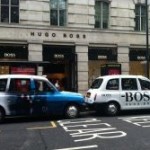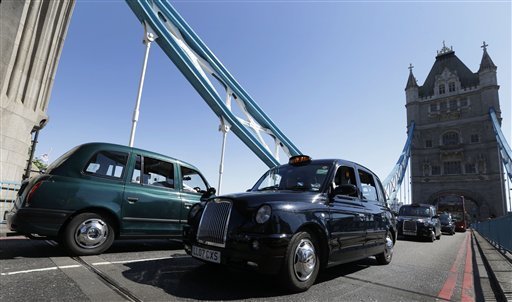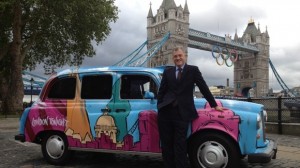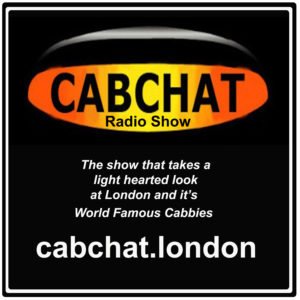by News Desk | Jul 28, 2012 | London News, World News

London — It’s midnight in this city that never sleeps, although it occasionally nods off after a big meal. I hop into a taxi.
Just off work and what else am I going to do? Go back to the hotel and watch a David Niven film on the telly?
It’s the perfect time to indulge in one of London’s true treats, a poor-man’s limo ride.
“Give me a one-hour tour of your city,” I say. “Show me anything you think is interesting.”
And we’re off.
I profiled in selecting a cab, preferring a longtime driver who might have a story or two. I get Brian Connelly, 68, a Jewish-Irish genuine cockney whose spent 43 years behind the wheel. Show me a cockney cab driver who isn’t affable, and I’ll show you fish without chips.
Also, it had to be a “black” cab. That refers not to color, but to the body style, the iconic clunky-looking London chugger. Anything else and you’re likely to get a driver who doesn’t have the Knowledge – the London taxi equivalent of a college degree in cab driving.
A lot of our tour will be down memory lane. Connelly isn’t bitter about modern changes, but is wistful for the good old days. Many of the neighborhoods he shows me are populated by ghosts.
“This is Fleet Street,” Connelly says. “All the great newspapers used to have offices here. Whenever you picked up a journalist, they was always, always, always drunk. Journalists then had a lot of power, and they were under a lot of pressure, hence all the drinking.”
I ask Brian if he’s disappointed to have a sober news guy in his cab. He’s too nice to say he preferred those raging-drunk, ink-stained power-brokers of yore.
The streets are nearly deserted, to be re-clogged come morning. Many lanes on main London streets are marked for Olympic vehicles only; everyone else gets hopelessly bumper-to-bumpered. London cab drivers are irate that their taxis are not accorded Olympian status.
“There was a protest Monday,” Connelly says. “One cabbie jumped off the Tower Bridge.”
Now we’re in Cheapside, East London, and Connelly pulls up to an ancient church.
“That’s St. Mary-le-Bow. It was destroyed in the Great Fire of 1666, rebuilt byChristopher Wren. You’re a true cockney if you’re born within the sound of the Bow Bells.”
True cockneys: Charlie Chaplin, Sid Vicious, Len Goodman. Also the Kray twins, Ronnie and Reggie, ruthless ’50s-’60s mobsters who were tight with Sinatra and Judy Garland, and were folk heroes to the locals. Now the Bow Bells peal for immigrants from Asia and other lands. The old true cockneys long ago moved to the suburbs and beyond.
Connelly says that in his youth, the ’60s, he was a “mod,” a dedicated follower of fashion. Impressed the birds with his exotic Levis, unavailable in England but bought off U.S. ship crewmen.
Connelly decided in his early 20s to become a cab driver. A serious life commitment but a way to escape the squalor.
“Big hours, big money,” Connelly says. “Sky’s the limit.”
He spent three years as an unpaid Knowledge Boy, riding a moped and learning London in a circle within a six-mile radius of mid-city.
The Knowledge Boy (or Girl) must make “an appearance” – take an oral test of his grasp of London. Fail the test and he must try again a month later. Most fall short numerous times. It took Connelly 19 months to pass, to earn his badge and official certificate proving he possesses the Knowledge.
A proper London cabbie has a high-def GPS embedded in his cerebral hard drive. Connelly could probably drive his shift blindfolded.
He is a “musher,” an owner-driver. Some drivers rent a cab for 220 pounds a week. Connelly bought his for 37,000 pounds. He must present it every year for rigorous inspection. If it’s not impeccably clean and mechanically perfect, Connelly is out of business. When a cab is 15 years old, it is removed from service. Connelly just sold his retired Fairway, in near-mint condition, for 700 pounds.
The new models are superior in almost every way, but “these have not got the style.”
Now we’re in Spitalfields, another scruffy East End neighborhood, Jack the Ripper’s old stabbing grounds. We cruise past a pub that was named the Ten Bells when one of Jack’s victims had her final drink there. Now yuppies sip and mingle.
One alley-like street is teeming with Bangladeshi men in Muslim caps. We pass Brian’s favorite bagel shop. He pronounces it “BY-gull.”
Connelly has great reverence for the 18th century apartments and shops, in their various states of decay and preservation.
“These buildings are from the time of Queen Victoria, of Charles Dickens!” he says.
London back then, Connelly observes, was the world’s most civilized and beautiful city, and the most squalid slum on Earth, the two opposites separated by a couple kilometers.
A plastic Elvis swivels on Connelly’s dashboard.
“Me and my wife are in the rock-n-roll scene,” he says. “Every weekend we go jiving. Go to different clubs and dance to Buddy Holly records, Chuck Berry, Elvis.”
Jiving helps keep Connelly in business. Every cabbie past 65, like his car, must have an extensive annual checkup. If your blood pressure or cholesterol level exceeds strict standards, turn in your badge, mate, you just retired.
Four nights a week Connelly hits a nearby track to run 2 to 3 miles.
Back in the day, he says, cab drivers were a fraternity. They played golf together every week, ate meals together during shifts.
“We had fabulous camaraderie. Now all that is gone. Now you see guys go to McDonald’s, get a hamburger, sit in their car and eat it.” He shakes his head.
Connelly has two sons, both born within the sound of the Bow Bells. Danny is a cabbie, Mark is a professor of World War I history at Kent University.
There’s my hotel. The ghosts of Fleet Street call me to a flagon of grog. I now have a one-hour degree in cabology. I have knowledge of The Knowledge. My tuition: 65 quid.
Brian says cheers like we’re old mates, and he and Elvis drive away into the night.
San Francisco Chronicle http://sfgate.com
by News Desk | Jul 25, 2012 | London News
 Hugo Boss has launched an advertising campaign with London Taxi Advertising, which will see cabs wrapped in full livery for 12 months.
Hugo Boss has launched an advertising campaign with London Taxi Advertising, which will see cabs wrapped in full livery for 12 months.
Two designs will run for the launch, one full livery branded cab with the Hugo Boss logo raising awareness, and another blue cab showcasing the Autumn/Winter collection, which will be re-wrapped later in the year to promote the 2013 Spring/Summer collection.
London Taxi Advertising was appointed by Media Agency Group, and will supply and wrap the cabs.
John Kehoe, director of the Media Agency Group, said: “We are delighted to promote an international fashion brand on London taxis, showcasing the attractive visual image of the Hugo Boss Campaign. We are one the largest independent buyers of Outdoor Advertising in the UK and have trialled a number of leading taxi companies in the past, but going forward we will continue to work with London Taxi Advertising. The team demonstrated sound understanding of the market during their pitch and offered the greatest ROI for our client. London Taxi Advertising has executed the campaign to the highest standards from the printing and fitting, to providing the best brand ambassadors driving the taxis that London has to offer.”
by News Desk | Jul 25, 2012 | London News

Taxi Drivers drive slow across Tower Bridge demonstrating against exclusion from the Olympic Lane Network
LONDON (AP) — Confusion, frustration and delays reigned on London’s congested roads Wednesday, as lanes reserved for Olympic VIPs came into force two days before the start of the games.
Traffic jams blocked some of the main routes into the city as the wildly unpopular “Games Lanes” took effect. The 30 miles (48 kilometers) of lanes are to operate from 6 a.m. to midnight throughout the games, and cars or taxi cabs that stray into them face a 130-pound ($200) fine.
Thousands of London drivers have switched to public transport, only to encounter severe delays on several Underground subway lines caused by power supply problems and signal failures. Severe delays were reported on the city’s Central and Hammersmith subway lines with ripple delays affecting other lines.
British officials — who have been advising Londoners for weeks to plan ahead, allow extra time or just stay home — advised a stiff upper lip.
“There will be a lot of disruption and London is a congested city anyway,” Transport Secretary Justine Greening told BBC television.
As host city, London is as cosmopolitan as they come, but transport is its weak spot: Traffic often clogs up on its narrow, historic roads, bus schedules can change at a moment’s notice, and the famous Underground suffers from daily delays and infrastructure that in parts is more than a century old.
For a city of its size, London has surprisingly few highways or wide thoroughfares, which means that most roads have multiple traffic lights and pedestrian crossings. Olympics organizers have repeatedly urged people to avoid driving their cars, to walk and bike ride around, and for spectators to go to events using public transport.
“Drivers do have somewhere to go, but it’s been a bit confusing,” said Paul Watters, head of road policy at the British Automobile Association. “We know it’s going to be tricky and difficult, and it’s bound to be full of teething problems. We’re almost there now so hopefully it will be better.”
Critics argue that the Olympic lanes — open only to athletes, officials, journalists, emergency services and games marketing partners — are elitist and make life difficult for everyone else. Britain relies on traffic cameras to spot infractions, so many people won’t know they’ve been ticketed till the bad news arrives in the mail.
To make things even more confusing, the lanes will be open to regular drivers if Olympic traffic is light, with the information displayed on electronic signs.
The International Olympic Committee had specifically demanded the lanes be created after learning lessons from previous games — one of the worst being Atlanta in 1996, where bus drivers got lost and some athletes arrived moments before their events.
In London, some of the loudest opposition to the Olympic VIP lanes has come from the city’s cabbies, who have staged two recent demonstrations that brought central London traffic to a standstill. They say being banned from Olympic lanes jeopardizes their business by creating much longer — and costlier — cab rides for customers.
“We’re not going to be able to drop passengers where they want to go,” said Lee Osborneof the United Cabbies Group, which protested with about 50 cabs at Tower Bridge on Tuesday. “Traffic in London is pretty bad as it is, and now passengers are going to suffer with the meter just ticking away.”
London’s Tube network is the most popular way to get across town, but it groans with age — its first line, the Metropolitan, opened in 1863. Today, that line still runs alongside more than a dozen others in a half-modernized system that handles roughly 12 million trips a day.
Officials are expecting up to 15 million subway trips a day during the Olympics.
In all, the British government has injected 6.5 billion pounds ($10 billion) to upgrade the transport network for the games. Whether that is enough is still an open question.
“It can’t even cope in normal times, all it takes is one problem and the whole system gets paralyzed,” said Tony Shelton, an accountant who was riding the Northern line. His journey was only slightly delayed but he said: “I’ll probably avoid coming into town.”
by News Desk | Jul 25, 2012 | London News
A man has dived headfirst off Tower Bridge during a protest by London taxi drivers against their ban from using Olympics Games Lanes.
The group of drivers travelled slowly across Tower Bridge, tooting their horns.
A man was arrested after jumping from the bridge into Thames.
Last week taxi drivers brought Parliament Square to a halt, claiming they should be able to use the lanes as well as officials and athletes.
“Start Quote
Please do not leave your taxi unattended! We have reports that one taxi driver has done just that in spectacular fashion!”
Taxi driver on Twitter
The diver, believed to be a taxi driver, was pulled from the river by police. A man had previously contacted media organisations warning he was going to attempt the stunt.
A Metropolitan Police spokesman said: “Around 4pm a man who was taking part in a planned demonstration jumped into the River Thames from Tower Bridge.
“Officers from the marine policing unit rescued the man. He has been arrested for a public order offence.”
A photograph posted on Twitter appeared to show the man entering the water headfirst in a streamlined diving position.
One taxi driver then Tweeted: “Please do not leave your taxi unattended! We have reports that one taxi driver has done just that in spectacular fashion!”
The diver wore what appeared to be a white Stetson hat
A BBC reporter said the man was almost hit by a tourist ferry in the water.
Traffic was again brought to a standstill during the protest, and there was a noticeable police presence.
A BBC correspondent estimated that about 50 cabs took part, with drivers sounding their horns in unison to make their presence felt.
The United Cabbies Group said on Twitter that it was happy with the turnout, which saw about six police vans at the scene.
Leon Daniels, Transport for London’s managing director of surface transport, said: “The first taxi protest was attended by a tiny minority of drivers, and they do not represent the views of the vast majority of London’s taxi drivers.
“It is a real shame that people who claim to represent some of the honest and most hard-working people in London, the taxi trade, have acted in this way.”
by News Desk | Jul 25, 2012 | London News

“Have you done the Knowledge?”… “Will you go south of the river”… “You’ll never guess who I had in the back of my cab the other day”… Seriously, the jokes flying in my direction have been so funny I almost crashed my cab.
That’s right – my cab. Just as the cold reality of the Olympic lanes threatens to bring London to a grinding halt, I’ve been given the job of heading out into the thick of it – and a cab to do it in. But, my friends, this is no ordinary black cab.
Let me say here that I love ordinary black cabs; not only are a London trademark, if you’ve ever got into a taxi in other big cities round the world, you’ll know that our cabbies are, bonnet and bumper, ahead of them all. However, I’m delighted to say that my cab is not black. It’s blue. And green… and orange, yellow and pink. Seriously, Rice and Lloyd-Webber should write a musical about it… ‘Close Every Door (but don’t slam it)’. You can have that, Sir Tim.
The cab was black when London Tonight bought it. After a long life on London’s roads, it look set for a life of ferrying fare-passengers around a town north of Watford but ‘M116 VMK ‘ then caught our eye and its future was suddenly looking a lot more ‘colourful’. Taken to a artist’s studio (mechanic’s garage) in Camden, it was then given a whole new look, courtesy of the Graffiti Kings. I think you’ll agree that the result is eye-catching. While I’ve never been a huge fan of the sort of mindless spraying of walls, bus-stops and tube carriages, the Graffiti Kings are artistic royalty and I love what they’ve done to my cab: a traditional London theme in vibrant colours, with a modern twist. (Brian Sewell, your job is safe.)
Next question then – what are we going to do with it? Well, the idea is that I’ll be driving around our capital during the Olympics, reporting on how London and the Games are rubbing along together. Sometimes there may be friction, of course. At other times, we hope, sparks of excitement. No one can predict what the Olympic stories of the day will be – but there’ll be plenty and we’ll be reporting on them – along with the rest of the world’s media. We’ll be claiming the home advantage, obviously.
While the reporting certainly will present its challenges, I’m slightly more concerned about the cab work, so any insider tips on how to keep my cool would be most welcome. When I went out for a bit of filming for the first time last week, I was only in the cab for about two and a half hours, but one cabbie’s secret is out already. It’s tough on the backside – no laughing matter, my bum was numb.
However, I did rather enjoy being part of the cabbie clan, with other (unwitting) brothers and sisters letting me out, letting me in, not swearing when I did a loony u-turn (you’ve got to love the turning circle). I hereby promise that I did do, and I will do, my best to return the favours.
So, the opening ceremony will fire the starting gun on a busy two weeks for my cab and me. Keep an eye out for us and do feel free to tweet any sightings. We’ll be tweeting our journey plans at @OllyCab.
Who knows, my laugh-out-loud colleagues might also get a tweet (not while I’m dwiving obviously). No, I haven’t done the knowledge… Yes, I will go south of the river (and north)… and as for who I had in the back of my cab the other day – a cameraman called Pete.
See you on the road.












Recent Comments